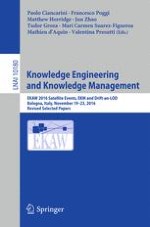This book contains the best selected papers of two Satellite Events held at the 20th International Conference on Knowledge Engineering and Knowledge Management, EKAW 2016, in November 2016 in Bologna, Italy: The Second International Workshop on Educational Knowledge Management, EKM 2016, and the First Workshop: Detection, Representation and Management of Concept Drift in Linked Open Data, Drift-an-LOD 2016.
The 6 revised full papers included in this volume were carefully reviewed and selected from the 13 full papers that were accepted for presentation at the conference from the initial 82 submissions. This volume also contains the 37 accepted contributions for the EKAW 2016 tutorials, demo and poster sessions, and the doctoral consortium. The special focus of this year's EKAW was "evolving knowledge", which concerns all aspects of the management and acquisition of knowledge representations of evolving, contextual, and local models. This includes change management, trend detection, model evolution, streaming data and stream reasoning, event processing, time-and space dependent models, contextual and local knowledge representations with a special emphasis on the evolvability and localization of knowledge and the correct usage of these limits.
